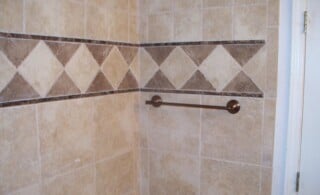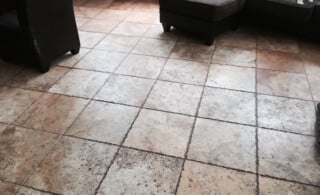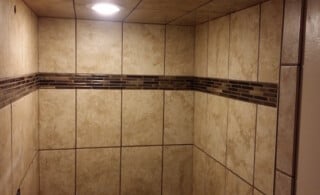Tile is virtually maintenance-free which adds to its appeal for many homeowners as a no-hassle solution to flooring needs. However, there are some things you still need to keep in mind when caring for your tile in order to keep it shining and spotless.
Tile Do’s and Don’ts
Do’s
- After installation, apply tile and grout sealer in order to protect your flooring.
- Conduct a routine maintenance check of your tile for dirt, stains, or cracks.
- Strategically install rugs or mats (especially in entryways and exits) to avoid unnecessary slipping or scratching.
- Always use dirt-free water during cleaning. You may have to stop and make a new soapy solution every 100 square feet as to avoid reintroducing dirt to the tile.
- Always perform routine cleaning maintenance to your tile. Even though tile tends to take care of itself, it still needs some help from time to time.
Don’ts
- Don’t use bleach or any acidic solutions to your tile: they cause more harm than good.
- Don’t use scouring pads or steel wool on your tile, ever. Unless you want scratches.
- Never drop anything on your tile. Though tile is durable, it isn’t indestructible to cracks and chipping.
Always know the limitations of your particular tile. Each form of tile comes with its own cleaning solutions, processes, waxing restrictions, and sealer constraints, so ask your contractor about how to care for you particular flooring.
Specific Tile Maintenance
Each type of tile is a bit different, so here are few tips about maintaining your specific kind of tile:
Ceramic Tile: Ceramic tile requires practically no maintenance at all, just warm water and mopping. Then let it dry itself to increase the shine.
Glazed Tile: Glazed tile is great because of its high-gloss, so when cleaning it, simply vacuum any dirt first and then simply mop with warm water. Avoid any type of detergent since this can leave a nasty film on your tile, thereby removing its gloss. If a deeper cleaning is necessary, a capful of vinegar to a gallon of warm water should do the trick. Always make sure you rinse the tile afterwards with more warm water.
Metal Tile: Don’t use any scouring pads that may scratch the finish. Once again, simply use warm water to clean. Like any tile, you never want to use acidic products that may harm the surface and discolor the grout.
Glass Tile: Use a soft towel or cloth to wipe the tile. Never use cleaners designed to clean stone since this may etch the glass in some cases. You may want to use a non-abrasive cleaner as well, but make sure it is always grout-cleaning compatible.
Stone Tile: Stone tile requires different cleaners than ceramic tiles in order to avoid scratching or dulling. Since stone tile can scratch easily, vacuum and mop often. For deeper cleaning, you never want to use solutions that could etch the stone (that means even vinegar and water). Instead buy specialty stone cleaner from a flooring store and gently buff out any stains or discoloration. Allow it to sit for a few moments and then agitate the tile with a sponge. Afterwards, you can wax your stone tile to make it shine.
Overall Tips
Post-installation Grout Cleaning: Sometimes after the initial installation, while the tile is curing for a day or two, you may find you have grout haze. This can be easily buffed out, and often your tile contractor will help you with this temporary problem by removing it themselves or by suggesting the appropriate “grout haze cleaner” that will typically take care of the trouble in one application.
Routine Grout Cleaning: Every now and again the grout between your tiles will become stained with a build-up of oils, mildew, or algae. To clean this up simply buy a tile-and-grout cleaner which is usually available in any home improvement store or floor covering specialty shop. Always follow the merchandise instructions for proper application.
Tile is the easiest type of flooring to maintain. Though there are certain limitations and restrictions depending on the type of tile you have, you can often handle the routine cleaning and maintenance on your own as long as you follow your contractor’s advice and instruction. Plus, everyday maintenance never takes long and even the more rigorous cleaning is few and far between. However, if you do run into a more serious problem (especially when in comes to cracks and chipping), always call a trained tile contractor for the solution. No need to make problems worse when you can just as easily ask from some help.
 The Basics of Ceramic Wall Tile Installation
The Basics of Ceramic Wall Tile Installation  Stunning Travertine Tile
Stunning Travertine Tile  Ceramic Wall Tiles
Ceramic Wall Tiles  Mirror Doors and Tile
Mirror Doors and Tile  How to Build a Custom Tiled Shower Pan
How to Build a Custom Tiled Shower Pan 

Are You Familiar With This Topic? Share Your Experience.